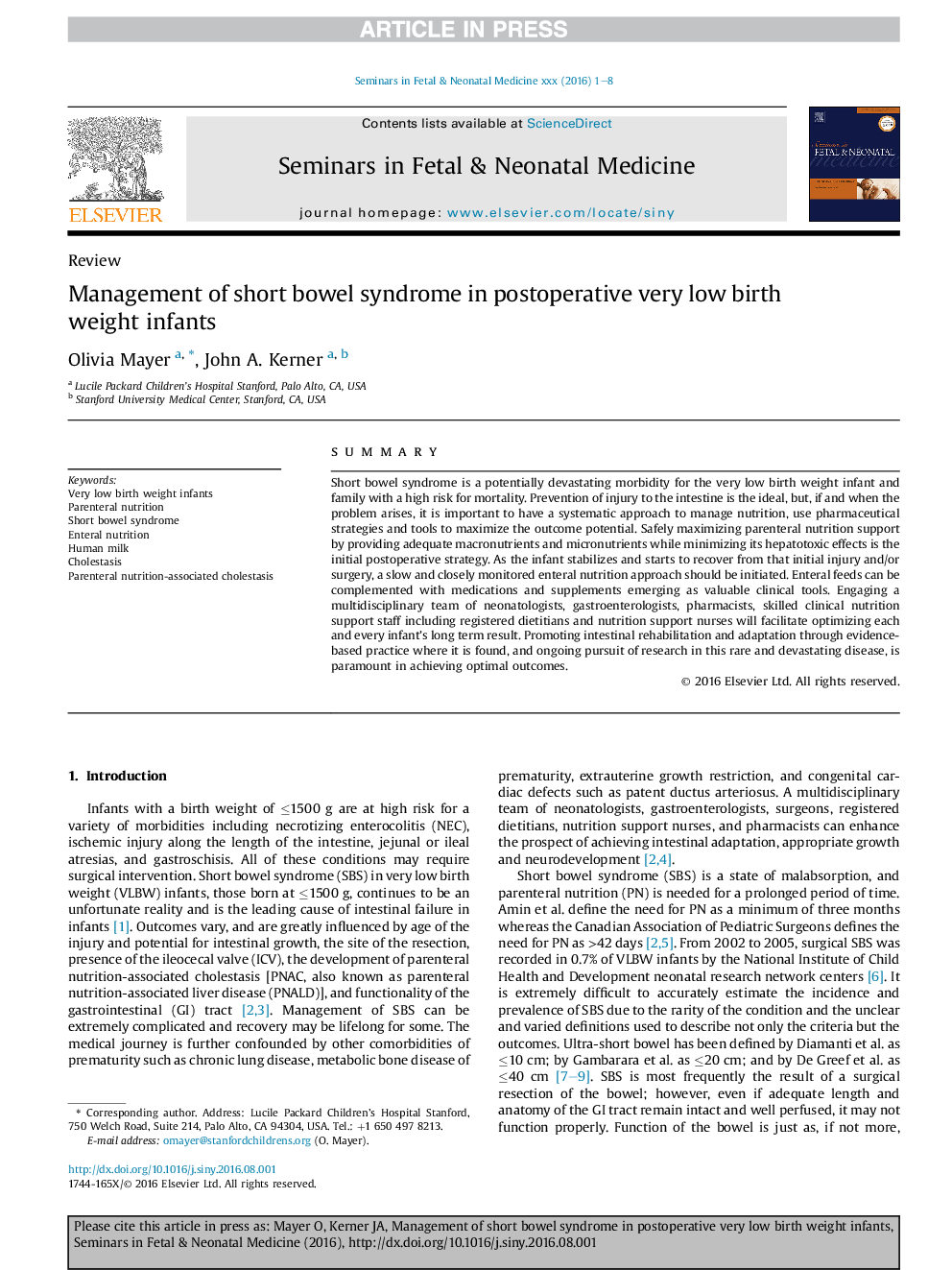| کد مقاله | کد نشریه | سال انتشار | مقاله انگلیسی | نسخه تمام متن |
|---|---|---|---|---|
| 5696906 | 1410283 | 2017 | 8 صفحه PDF | دانلود رایگان |
عنوان انگلیسی مقاله ISI
Management of short bowel syndrome in postoperative very low birth weight infants
ترجمه فارسی عنوان
مدیریت سندرم روده کوچک در نوزادان کم وزن پس از عمل
دانلود مقاله + سفارش ترجمه
دانلود مقاله ISI انگلیسی
رایگان برای ایرانیان
کلمات کلیدی
نوزادانی که وزن کمتری دارند، تغذیه تزریقی سندرم روده کوچک، تغذیه انتالال، شیر انسانی، کلستاز، کلستاز وابسته به تغذیه با قاعدگی،
ترجمه چکیده
سندرم روده کوچک یک بیماری مخرب بالقوه ویرانگر برای نوزاد و خانواده بسیار کم وزن است که خطر ابتلا به مرگ و میر را بالا می برد. جلوگیری از آسیب روده ای ایده آل است، اما اگر و در صورت بروز مشکل، مهم است که رویکرد سیستماتیک برای مدیریت تغذیه، استفاده از استراتژی های دارویی و ابزارها برای به حداکثر رساندن پتانسیل نتیجه باشد. حمایت از تغذیه با استفاده از مکمل های مغذی و مواد مغذی کافی، به حداکثر رساندن حداکثر استفاده از مواد مغذی و کاهش اثرات کبدی آن، استراتژی اولیه پس از عمل است. همانطور که نوزاد تثبیت می شود و شروع به بهبودی از آن آسیب اولیه و / یا جراحی می شود، باید یک رویکرد تغذیه انتالال با آرام و دقیق بررسی شود. تغذیه انتالال می تواند با داروها و مکمل هایی که به عنوان ابزار بالینی بالقوه ظاهر می شوند، تکمیل شود. جذب یک تیم چند رشته ای از متخصصین طب جدید، متخصصان متخصص گوارش، داروساز، کارکنان مراقبت های بالینی متخصص ماهر از جمله متخصصین تغذیه و پرستاران مراقبت های تغذیه، هر یک از نتایج بلندمدت نوزاد را بهینه سازی می کنند. ترویج توانبخشی و انطباق روده ها از طریق روش مبتنی بر شواهد که در آن یافت می شود و پیگیری در حال انجام تحقیقات در این بیماری نادر و ویرانگر در دستیابی به نتایج مطلوب بسیار مهم است.
موضوعات مرتبط
علوم پزشکی و سلامت
پزشکی و دندانپزشکی
زنان، زایمان و بهداشت زنان
چکیده انگلیسی
Short bowel syndrome is a potentially devastating morbidity for the very low birth weight infant and family with a high risk for mortality. Prevention of injury to the intestine is the ideal, but, if and when the problem arises, it is important to have a systematic approach to manage nutrition, use pharmaceutical strategies and tools to maximize the outcome potential. Safely maximizing parenteral nutrition support by providing adequate macronutrients and micronutrients while minimizing its hepatotoxic effects is the initial postoperative strategy. As the infant stabilizes and starts to recover from that initial injury and/or surgery, a slow and closely monitored enteral nutrition approach should be initiated. Enteral feeds can be complemented with medications and supplements emerging as valuable clinical tools. Engaging a multidisciplinary team of neonatologists, gastroenterologists, pharmacists, skilled clinical nutrition support staff including registered dietitians and nutrition support nurses will facilitate optimizing each and every infant's long term result. Promoting intestinal rehabilitation and adaptation through evidence-based practice where it is found, and ongoing pursuit of research in this rare and devastating disease, is paramount in achieving optimal outcomes.
ناشر
Database: Elsevier - ScienceDirect (ساینس دایرکت)
Journal: Seminars in Fetal and Neonatal Medicine - Volume 22, Issue 1, February 2017, Pages 49-56
Journal: Seminars in Fetal and Neonatal Medicine - Volume 22, Issue 1, February 2017, Pages 49-56
نویسندگان
Olivia Mayer, John A. Kerner,
